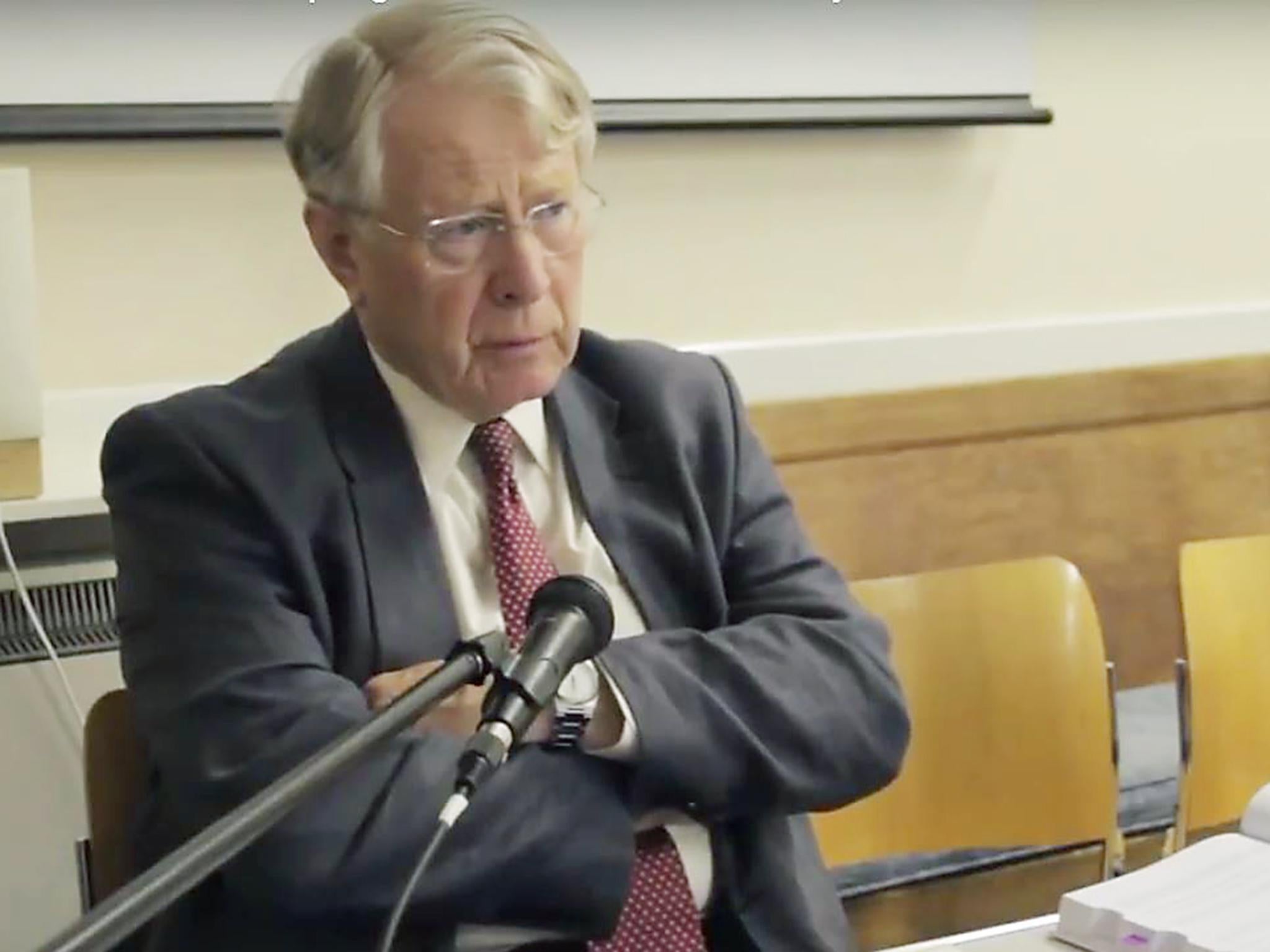Anti-EU ministers show 'invincible ignorance' over European Court, says top ex-judge
Exclusive: As part of our Road to Brexit series, former European Court of Justice judge Sir David Edward warns that withdrawal from the court will not be simple

A former judge at the European Court of Justice has slammed the “invincible ignorance” of Brexit-backing ministers who believe they can free the UK from the court’s influence.
Professor Sir David Edward told The Independent he was “astonished” at what he called misleading promises of autonomy from the court, made by Brexiteer politicians.
Theresa May is expected to make stripping the court of its power in the UK an election pledge when the Conservative manifesto is published, but Sir David’s outburst follows new Brexit negotiating guidelines from the EU which show the bloc will demand the court keeps a role in Britain.
His words also come alongside those of other academic and political experts underlining how difficult it will be for the Government to maintain its hard-line stance towards removing the court’s role in British life.
As the Government moves towards Brexit talks, former judge Sir David said severing ties with Europe’s highest court in Luxembourg will not be as simple as “Leave means Leave.”
He said he was “astonished” by the “invincible ignorance” of many ministers, calling claims that Britain will be able to achieve autonomy from the European Court of Justice (ECJ) “misleading” if it later plans to trade with EU member states.
“You can escape the jurisdiction of the ECJ, but you have got to comply with EU standards if you are going to export into the EU,” he told The Independent.
“And who decides what these standards are ultimately if there’s a problem? It’s the ECJ.”

Going further, former QC Sir David warned that anti-EU politicians, who for years have lambasted the European Court, will also turn their guns on British courts and judges, or anyone who disagrees with the way Brexit was being conducted.
The professor emeritus at the University of Edinburgh School of Law said the ECJ was not “stuffed with European judges who imposed their will on the unwilling British people”.
He added: “A great number of cases we decided were brought by British people precisely in order to be able to trade freely."
Since Ms May made freeing the UK of the ECJ a key promise in her Tory conference speech last year, cracks have begun to appear in the Government’s approach.
She later said: “We will not have truly left the European Union if we are not in control of our own laws.”
But when Brexit Secretary David Davis revealed his Great Repeal Bill in March, he had to admit that European case law would still have to be taken into account in British courts for years to come.
The Tories signalled that wriggling free of the court's jurisdiction could feature in their manifesto, despite the new guidelines that are now emerging from Brussels.
The “draft negotiating directives” state that any Brexit deal should “safeguard the status and rights derived from Union law at the withdrawal date, including those the enjoyment of which will intervene at a later date”, such as rights related to old-age pensions.
The document goes on to say those rights should be protected for “the lifetime” of the EU citizens living in the UK, before adding: “In these cases, the jurisdiction of the Court of Justice of the European Union (and the supervisory role of the Commission) should be maintained.”

Agreeing to the provision could mean that if the UK Government breaches an EU citizen’s rights after Brexit in relation to state pension payments, for example, the individual might call on the Luxembourg court to remedy the issue.
President of the European Parliament Antonio Tajani has gone on to say that any Brexit deal that did not protect EU citizens’ rights would be vetoed by the body he leads.
University of Oxford law professor Paul Craig agreed that maintaining “pure sovereign authority” after Brexit will have difficulties.
“When we leave the EU, all rights and obligations cease. However, the reality is any UK business that wishes to do business in Europe will in effect have to comply with the relevant rules, so the idea we have some pure sovereign regulatory authority in the UK will simply not be true,” he said.
Ms May rejected the idea of staying in the single market in January, stating it “would mean accepting a role for the ECJ that would see it still having direct legal authority in our country”.
However, she has signalled some support for a transitional period and a “phased process of implementation” of any Brexit deal.
Catherine Barnard, a professor of EU law at the University of Cambridge, said she believed the Prime Minister finds herself in a political bind – forced to appease “hard Brexiteers” by being as uncompromising in her language as she can.
“Politically, [Ms May] has got to say Britain will be free from the ECJ because that is what the hard Brexiteers in the Government want. But in reality, two years is just not enough time to replicate the EU institutions,” Prof Barnard said.
“What will happen is there will be a divorce so she can say we have left, and then there will be transitional arrangements, which will mean from air safety to plant variety, it may well be that we will continue to use the EU bodies because we can't just set up those 50 or so bodies in that time. This means there may still be a role for the ECJ.”
She also pointed to what she believed was a recent “softening” in government language, as cabinet members come to recognise the “gargantuan exercise” that lies ahead of them.
Henri de Waele, European law professor at Nijmegen and Antwerp universities, said he expected further softening in the Government’s stance towards the ECJ as it realised the benefits of staying connected.
“Even the UK Government will recognise there are certain parts of the ECJ that we still want to subscribe to and, despite it being in contradiction to earlier promises, they will have to accept some share of the jurisdiction with the court,” he said.
“Politically that would be a very hard sell, but I could imagine over the next two years the UK Government would still have the common sense to see a certain interest or a particular need not to disconnect completely – but then if you do not disconnect completely, it’s almost impossible to avoid ECJ jurisdiction.”
The ECJ was seized upon in the run-up to the 23 June referendum as one of the main reason's Britain needed to “take back control”. Michael Gove, one of the leaders of the Leave campaign, argued EU institutions were responsible for imposing undesirable laws on the British public and many maligned the ECJ as an example of “faceless”, undemocratic bureaucracy.
Claude Labour, MEP and chair of the European Parliament’s influential Committee on Civil Liberties, Justice and Home Affairs, said it was time to be “honest” with the British public about the ECJ's value.
“Most people would not have been explained what the EU Charter of Fundamental Rights is – they won’t have had a handle on where the ECJ is useful to them, where it has improved their rights.
“They will have just seen it as some kind of interfering control from the outside and unfortunately, that continual denigration of it has created a situation where it has now become this symbolic thing that has to be removed,” he said.
A Government spokesman said: “The Government has been clear that in leaving the EU we will bring an end to the jurisdiction of the Court of Justice of the European Union in the UK and return powers from Brussels to the UK.
“This means that it will be UK law, not EU law, that is supreme and Parliament will be free to change the law where it decides it is right to do so.”
Join our commenting forum
Join thought-provoking conversations, follow other Independent readers and see their replies
Comments
Bookmark popover
Removed from bookmarks